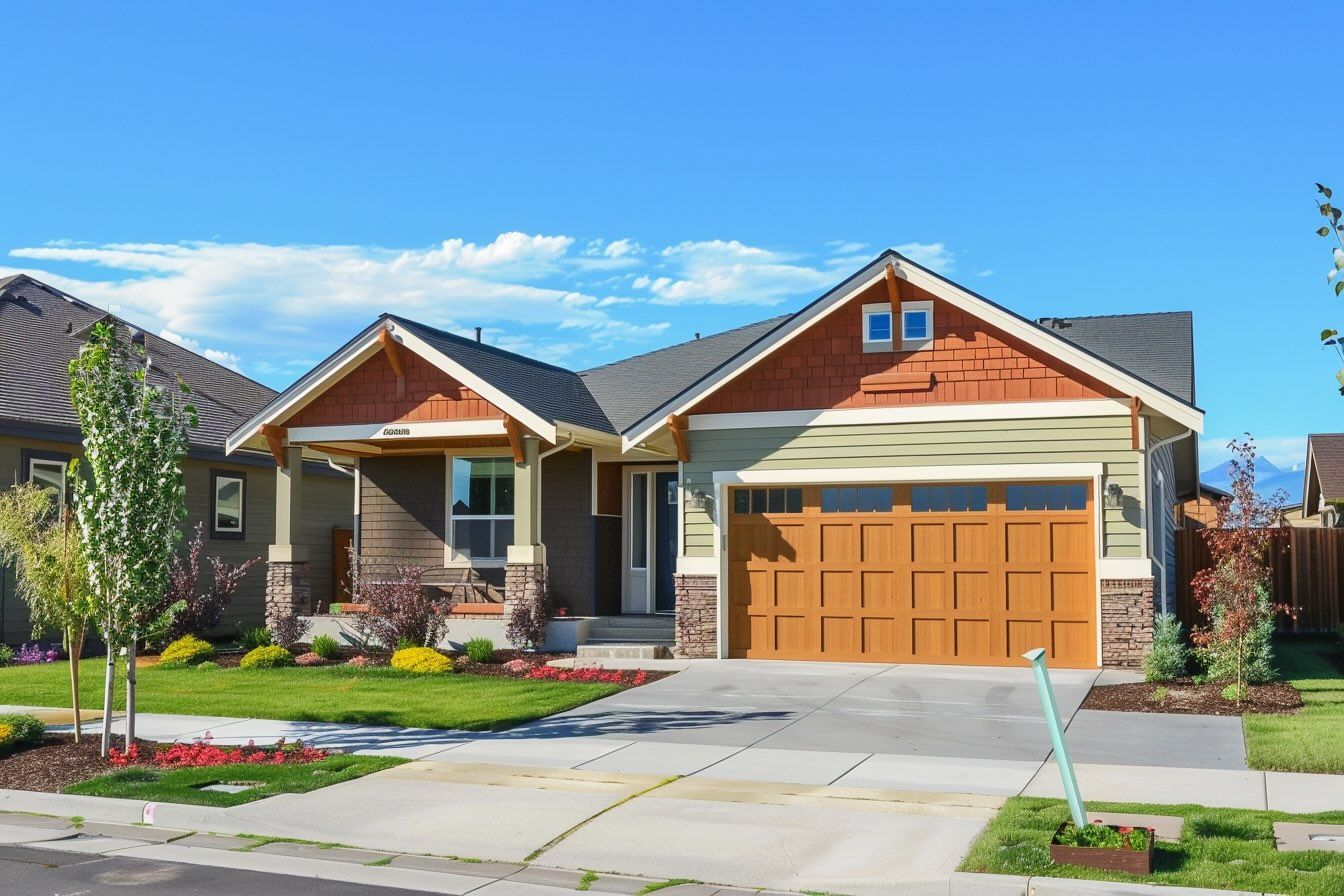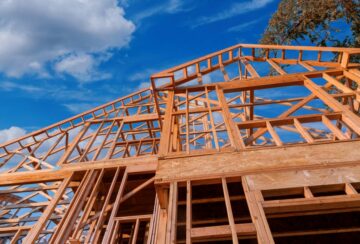
A garage can be a fantastic feature in a home. Not only does it act as added parking, but for many, it’s valued for its additional storage space. For others, they turn space into a home gym, office, or even a studio.
A garage has become more than just a practical space for parking vehicles. Its functional and aesthetic appeal offers more than convenience but helps increase buyer demand and enhance a home’s overall market value.
But how much value does a garage add to a house?
Benefits of Having a Garage
The garage is often overlooked in the grand scheme of home features. When buying a house, most buyers focus on the kitchen, bathrooms, and living spaces well before directing their attention to the garage.
But a garage is, in fact, a powerhouse of added value for homeowners and potential buyers alike. Its benefits extend well beyond the essential utility of vehicle storage, touching on aspects of security, organization, aesthetic appeal, and modern living requirements.
Security and Protection
A garage does more than house your car; it helps protect vehicles from theft, vandalism, and the unavoidable damages caused by nature.
In regions prone to extreme weather such as hail, snow, wind, and even sun, a garage’s protection can extend your vehicle’s life and protect valuable items such as tools and outdoor gear. When applying for car insurance, many companies will also offer lower premiums on cars stored in a garage.
Versatile Storage Solutions
Storage space is a commodity in today’s homes as consumerism increases. Garages serve as a solution for decluttering living space and storing away belongings that don’t need a permanent space in your home.
With the capacity to store everything from seasonal decorations to sports equipment, garages provide a space for items that don’t need to be housed within the main living areas. Unlike other storage spaces like attics or sheds, garages are convenient and easily accessible.
Increases Property Appeal
The aesthetic appeal of garages, particularly through garage door upgrades, can significantly impact a home’s curb appeal and, by extension, its value. A well-maintained garage can dramatically enhance the overall look of your home.
Given that garage door replacements offer one of the highest returns on investment in home renovations, upgrading your garage door is a smart move that boosts your property’s energy efficiency and visual charm.
Increased Property Value
Homes with garages often have a higher resale value. Buyers typically prefer and are willing to pay more for a home with a garage, viewing it as a significant amenity. Garages have evolved from mere parking spaces to versatile areas. As more people look for homes that offer these flexible uses, properties with garages become more attractive and sought after in the real estate market.
A garage can make a property stand out to potential buyers. This increased interest can lead to higher competition for the property, ultimately driving up its resale value. Essentially, the more people desire a feature in a home, the more valuable that feature becomes—and garages are at the top of the list for many buyers.
Moreover, in areas where parking is challenging, a garage adds significant value by solving a common problem. Therefore, it increases buyer demand for the property and, consequently, its worth. The ability of garages to meet these practical needs, combined with their potential for customization and adaptation to suit various needs, directly contributes to enhancing a property’s marketability and value.
Regional Value Considerations
The value added by a garage varies significantly across different parts of the country, reflecting the diverse needs and preferences of local markets.
For example, in Chicago, where the weather is poor, and parking is scarce, a garage adds a 38% premium. However, in Los Angeles, a garage only adds a 3.2% premium because the weather is good and the city sprawls, meaning that while parking might not be easy in all areas, it is accessible.
In cities with scarce parking, a garage can command a considerable premium, making homes far more attractive to buyers who value convenience and security. Conversely, in areas where outdoor space is more coveted, the functionality of a garage as a flex space can be a critical selling point.
Incorporating these elements into your home’s design or considering them when planning a garage addition can enhance your property’s value. Whether you’re looking to sell in the near future or simply aiming to improve your home’s functionality and aesthetic, the humble garage stands out as a key player in the real estate game, offering benefits that resonate deeply with the needs and desires of today’s homeowners and buyers.
Types of Garages and Their Impact on the Value of a House
Having a garage adds value to your home, but different types of garages have different amounts of value. For example, a two-car attached garage will add more value than a single-car garage.
If you’re deciding whether or not adding a garage is a good investment, first consider what kind of garage project suits the property and buyers’ preferences in your real estate market.
Attached Garages
An attached garage is part of a home’s main structure and has a door connecting the garage space to the living space. They are often less expensive to construct than detached garages since one wall is already part of the existing structure. Not only are attached garages often less costly to build, but most homeowners prefer them, especially in cold environments.
In many cases, an attached garage will add more value to your home than a detached garage. However, attached garages can limit the design and expansion possibilities of a home. They also may provide less privacy or noise isolation than detached garages, which can be a consideration for those using the space for workshops or studios.
Detached Garages
Detached garages have more flexibility in design and usage, allowing them to serve as workshops, studios, or even guest houses without disturbing the main household. This separation also provides enhanced privacy and noise reduction.
However, homeowners looking for a convenient area to store their car and belongings may not appreciate a detached garage as much as one attached. The lack of direct access to the home can be a disadvantage, particularly in bad weather conditions.
The main drawback of detached garages is the higher construction cost. They are a completely new structure with four walls, a roof, and a foundation. While more expensive, detached garages can significantly increase a property’s appeal and value.
This is especially true for a well-designed big garage that complements the home’s overall aesthetic. Detached garages are preferred by buyers wanting versatile, multi-use spaces. They potentially offer a higher return on investment in markets that value such flexibility.
Carports
Carports are the most cost-effective car storage option. They provide basic protection from sun and rain for vehicles without the significant expense of constructing a full garage. Homeowners choose carports because they are quick to install and can be a practical solution for a tight budget or limited space.
The downside of carports is that, unlike enclosed garages, they offer limited security and protection from the elements. They also don’t provide additional storage or extra room for living, which can limit their appeal to potential buyers.
While carports add some value by offering covered parking, the increase in property value is considerably lower than that achieved with an attached or detached garage. They are best suited for regions with mild weather conditions and homeowners prioritizing budget over additional space or security.
Garage Size Matters Most
If you’re trying to decide whether to add an attached or detached garage to your house, consider the size of the garage you can add and the layout of your lot—the size of a garage matters.
The minimum size of garages by car size is:
- One-Car Garage: 12 feet wide by 20 feet deep
- Two-Car Garage: 20 to 24 feet wide by 20 to 24 feet deep
- Three or More Car Garage: Start with a baseline of about 32 feet wide by 22 feet deep and adjust based on your needs and the vehicles’ sizes.
If you plan to use your garage for purposes other than parking vehicles, such as a workshop, gym, or storage area, consider the space required. For example, if you want to ensure enough space to add a workbench alongside your vehicles, plan to add an extra 6 to 10 feet of depth or width.
Your property size and local zoning regulations will also play a crucial role in determining how large your garage can be. It’s essential to check with your local building department for any restrictions or requirements regarding garage size, setbacks, and height before finalizing your plans. No matter the carport or garage project size, you’ll need a building permit.
How Much Does a Garage Cost?
The cost of building a garage varies widely based on your location, the structure’s size, materials, and any additional features you choose to include. Your expenses will depend on whether you’re considering a basic setup for vehicle storage or a fully equipped space with air conditioning, plumbing, and a workshop.
Here’s a breakdown using data from HomeAdvisor:
- 1-Car Garage
The average cost to build a one-car garage ranges from $10,500 to $27,000. For extra storage, a one-and-a-half-car garage can cost up to $32,000 for a basic build. - 2-Car Garage
A 2-car garage is one of the most common choices for homeowners, with building costs ranging from $14,500 to $40,300. The wider range in cost reflects variations in materials, finishes, and additional features like windows or specialized doors. - 3-Car Garage
The average cost for a three-car option ranges from $28,200 to $57,100. This estimation is only for a basic build and doesn’t include any specialized features.
Garage sizes and costs can increase incrementally. However, if you build a large garage that includes HVAC, plumbing, and extensive workshop features, the price can soar to over $100,000.
How to Enhance Your Garage for Maximum Value
Improving your existing garage increases its functionality and significantly enhances property value. Here, we provide some practical tips for homeowners looking to maximize their garage space with cost-effective enhancements.
Epoxy Flooring
Epoxy flooring is a durable, resilient solution that can instantly transform the look and feel of your garage.
It’s resistant to stains, chipping, and water damage, making it ideal for both storage and workshop spaces.
It’s an affordable upgrade option, usually costing between $2,500-3,000 for a two-car garage.
New Garage Door
A new electric garage door can improve your home’s curb appeal and the garage’s functionality.
According to Angie’s List, the cost of a new garage door ranges from $1,500-6000. HomeServe states that the ROI of a new garage door is 102%.
Built-in Storage
Custom or semi-custom cabinets can be tailored to fit a garage and organize tools, gardening supplies, and other essentials, keeping them accessible yet out of sight. Opt for durable materials and a design that complements the interior of your garage for a cohesive look. The ROI of garage storage can range from 64-81%
Maximize the vertical space in your garage with overhead storage solutions. This is an excellent way to declutter the floor space and store seasonal items, sports equipment, and other seldom-used belongings.
Overhead storage systems, including racks and hoists, come in various forms and are relatively inexpensive to install. By keeping things off the ground, you also protect them from water damage and make cleaning easier.
Insulation and Climate Control
Adding insulation to the walls and installing a heating/cooling system can turn your garage into a comfortable, year-round space.
This is particularly appealing for garages used as workshops, gyms, or recreational areas, adding significant value to potential buyers looking for multi-functional spaces. Insulation upgrades can deliver an ROI of up to 83%.
Garage Strategies from FastExpert
A garage provides a valuable asset that enhances your home’s value, appeal, and functionality. These property features provide secure storage, protect your vehicle, or offer additional living and workspace. Whether attached, detached, or a carport, each type of garage has its advantages.
If you already have a garage, consider upgrades such as epoxy flooring, improved lighting, and built-in storage to make it an even more attractive feature to potential buyers.
Homeowners who want to maximize their home’s value should evaluate the impact of a well-designed and functional garage. If you’re seeking professional advice or real estate services to help you make the most of your garage and home, start with FastExpert.com.
With the right guidance and enhancements, your garage can significantly boost your home’s marketability, making it a standout asset in today’s competitive housing market.
- SEO Powered Content & PR Distribution. Get Amplified Today.
- PlatoData.Network Vertical Generative Ai. Empower Yourself. Access Here.
- PlatoAiStream. Web3 Intelligence. Knowledge Amplified. Access Here.
- PlatoESG. Carbon, CleanTech, Energy, Environment, Solar, Waste Management. Access Here.
- PlatoHealth. Biotech and Clinical Trials Intelligence. Access Here.
- Source: https://www.fastexpert.com/blog/how-much-value-does-a-garage-add-to-a-house/
- :has
- :is
- :not
- :where
- $UP
- 000
- 10
- 100
- 2%
- 20
- 200
- 22
- 24
- 300
- 32
- 500
- 6
- a
- ability
- About
- access
- accessible
- achieved
- across
- Act
- adaptation
- add
- added
- adding
- addition
- Additional
- Adds
- adjust
- advantages
- advice
- aesthetic
- affordable
- After
- Aiming
- AIR
- Air Conditioning
- alike
- All
- Allowing
- alongside
- already
- also
- amounts
- an
- and
- Angeles
- any
- appeal
- appealing
- Applying
- appreciate
- ARE
- AREA
- areas
- AS
- aspects
- asset
- At
- attached
- attention
- attractive
- average
- away
- Bad
- based
- Baseline
- basic
- BE
- because
- become
- before
- benefits
- BEST
- between
- Beyond
- Big
- boost
- boosts
- both
- Breakdown
- budget
- build
- Building
- built-in
- but
- BUYER..
- buyers
- Buying
- by
- CAN
- Capacity
- car
- car insurance
- cars
- cases
- caused
- challenging
- check
- chicago
- choices
- Choose
- Cities
- City
- Cleaning
- Climate
- cohesive
- cold
- combined
- come
- comfortable
- commodity
- Common
- Companies
- competition
- competitive
- completely
- conditions
- Connecting
- Consequently
- Consider
- considerable
- considerably
- consideration
- considering
- construct
- constructing
- construction
- consumerism
- contributes
- convenience
- Convenient
- conversely
- Cost
- cost-effective
- costly
- Costs
- country
- covered
- coveted
- critical
- crucial
- curb
- customization
- damage
- data
- decide
- Deciding
- deep
- deeply
- deliver
- Demand
- Department
- depend
- depth
- Design
- desire
- desires
- determining
- different
- direct
- Direct access
- directing
- directly
- Disadvantage
- diverse
- does
- Doesn’t
- Dont
- Door
- doors
- downside
- dramatically
- driving
- each
- easier
- easily
- easy
- efficiency
- Electric
- elements
- energy
- energy efficiency
- enhance
- enhanced
- enhancements
- Enhances
- enhancing
- enough
- ensure
- environments
- equipment
- equipped
- especially
- essential
- essentially
- essentials
- estate
- Ether (ETH)
- evaluate
- Even
- everything
- evolved
- example
- excellent
- existing
- expansion
- expense
- expenses
- expensive
- extend
- extension
- extensive
- extra
- extreme
- fact
- fantastic
- far
- Feature
- Features
- feel
- Feet
- First
- fit
- Flexibility
- flexible
- Floor
- Focus
- For
- forms
- Foundation
- four
- from
- full
- fully
- functional
- functionality
- future
- game
- garage
- Gear
- good
- grand
- Ground
- Guest
- guidance
- gym
- Have
- having
- height
- help
- helps
- here
- higher
- highest
- Home
- Homes
- House
- household
- houses
- housing
- housing market
- How
- However
- HTTPS
- humble
- hvac
- ideal
- if
- Impact
- improve
- improved
- in
- include
- includes
- Including
- Increase
- increased
- Increases
- inexpensive
- install
- installing
- instantly
- insurance
- interest
- interior
- into
- investment
- isolation
- IT
- items
- ITS
- jpg
- just
- keeping
- Key
- Kind
- kitchen
- Lack
- large
- Layout
- lead
- less
- Life
- Lighting
- like
- LIMIT
- Limited
- List
- living
- local
- location
- Look
- looking
- los
- Los Angeles
- lower
- Main
- make
- Making
- many
- Market
- market value
- Markets
- materials
- Matter
- Matters
- Maximize
- maximum
- May..
- meaning
- Meet
- mere
- might
- mild
- minimum
- Modern
- more
- most
- move
- much
- Nature
- Near
- Need
- needs
- New
- no
- Noise
- of
- off
- offer
- offering
- Offers
- Office
- often
- on
- ONE
- only
- Option
- or
- organization
- Other
- Others
- out
- Outdoor
- over
- overall
- overhead
- parking
- part
- particularly
- parts
- Pay
- People
- permanent
- plan
- planning
- plans
- plato
- Plato Data Intelligence
- PlatoData
- Play
- player
- Plumbing
- Point
- poor
- possibilities
- potential
- potentially
- powerhouse
- Practical
- prefer
- preferences
- preferred
- Premium
- price
- prioritizing
- privacy
- Problem
- professional
- project
- properties
- property
- protect
- protection
- provide
- provides
- purposes
- Quick
- RAIN
- range
- ranges
- ranging
- real
- real estate
- real estate market
- Recreational
- reduction
- reflecting
- reflects
- regarding
- regions
- regulations
- relatively
- required
- Requirements
- resilient
- resistant
- Resonate
- restrictions
- return
- returns
- Returns on Investment
- right
- ROI
- Role
- roof
- Room
- Scarce
- scheme
- seasonal
- secure
- security
- seeking
- sell
- Selling
- selling point
- serve
- Services
- Setbacks
- setup
- should
- Sight
- significant
- significantly
- simply
- since
- Size
- sizes
- smart
- snow
- soar
- solution
- Solutions
- Solving
- some
- sought
- Space
- spaces
- specialized
- Sports
- stand
- standout
- stands
- start
- States
- storage
- store
- stored
- storing
- strategies
- structure
- studio
- studios
- such
- Suit
- suits
- Sun
- supplies
- system
- Systems
- tailored
- than
- that
- The
- theft
- their
- Them
- therefore
- These
- they
- things
- this
- those
- Through
- tips
- to
- today’s
- tools
- top
- touching
- Transform
- true
- trying
- TURN
- type
- types
- typically
- Ultimately
- unavoidable
- unlike
- upgrade
- upgrades
- Usage
- use
- used
- uses
- using
- utility
- Valuable
- value
- valued
- variations
- various
- vehicle
- Vehicles
- versatile
- vertical
- viewing
- visual
- Wall
- want
- wanting
- Water
- Way..
- we
- Weather
- WELL
- What
- when
- whether
- which
- while
- WHO
- wide
- widely
- wider
- will
- willing
- wind
- windows
- with
- within
- without
- workshop
- Workshops
- worth
- yet
- you
- Your
- zephyrnet













